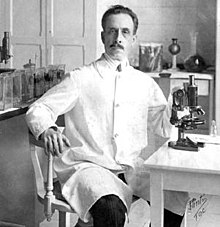Carlos Chagas
| Carlos Justiniano Ribeiro Chagas | |
|---|---|
 |
|
| Born | July 9, 1879 Oliveira, Minas Gerais, Empire of Brazil |
| Died | November 8, 1934 (aged 55) Rio de Janeiro, Brazil |
| Nationality | Brazilian |
| Fields | Physician |
| Institutions | Instituto Oswaldo Cruz |
| Alma mater | Medical School of Rio de Janeiro |
| Known for | Chagas disease |
Carlos Justiniano Ribeiro Chagas, or Carlos Chagas (Portuguese: [ˈkaʁˌlus ʒuʃˌtʃĩniˈɐ̃nu ʁiˈbejɾu ˈʃaˌɡɐʃ], [ˈkaʁˌlusːˈʃaˌɡɐs] in most Brazilian accents; in others and in Portugal, [ˈkaʁluʃːˈaˌɡɐʃ]; July 9, 1879 – November 8, 1934), was a Brazilian sanitary physician, scientist and bacteriologist who worked as a clinician and researcher. He discovered Chagas disease, also called American trypanosomiasis in 1909, while working at the Oswaldo Cruz Institute in Rio de Janeiro.
Chagas' work holds a unique place in the history of medicine. Working in primitive conditions, Chagas described in detail a previously unknown infectious disease: its pathogen, vector (Triatominae), host, clinical manifestations and epidemiology. Chagas was also the first to discover and illustrate the parasitic fungal genus Pneumocystis, later infamous for being linked to PCP (Pneumocystis pneumonia in AIDS patients).
...
Wikipedia
